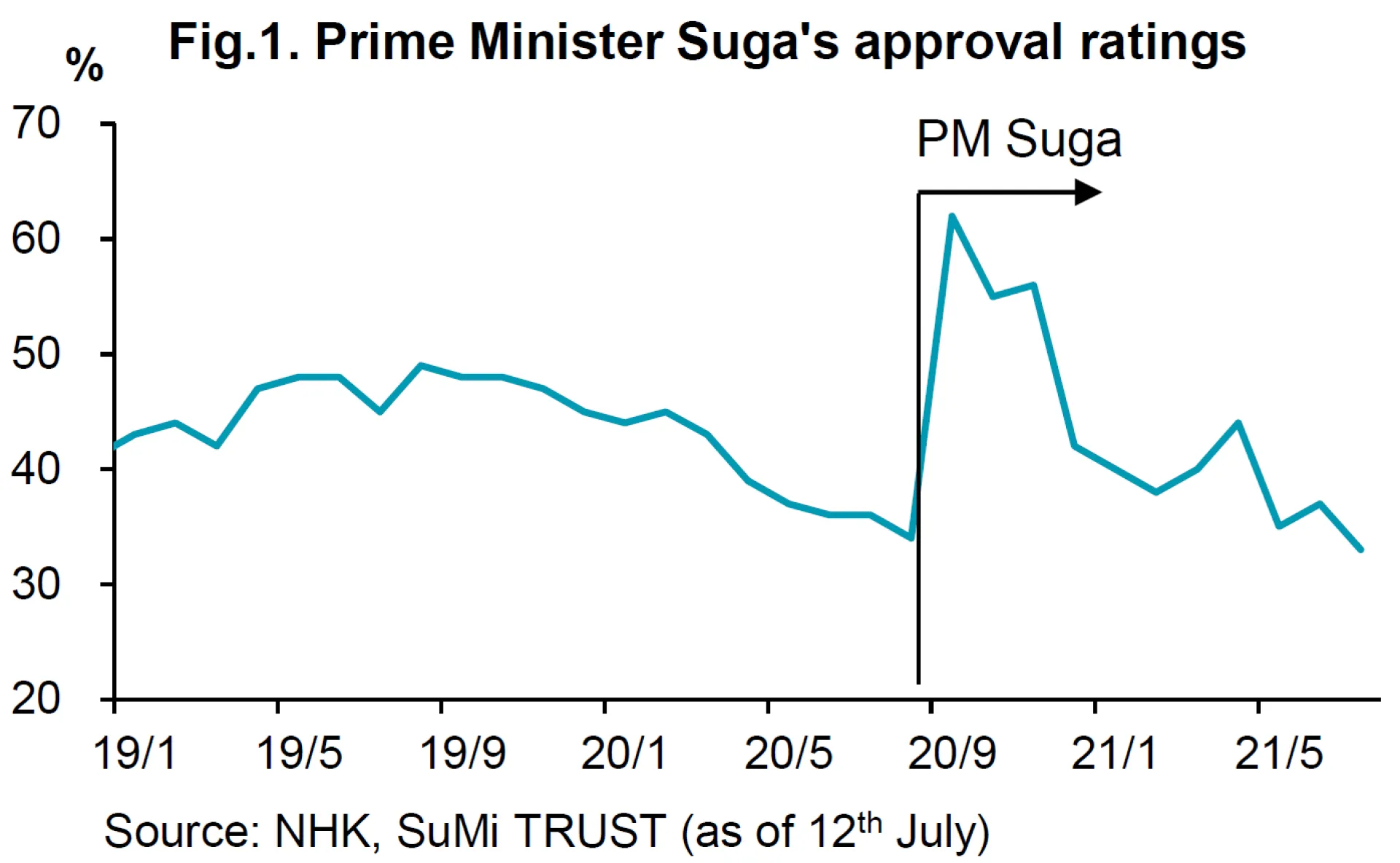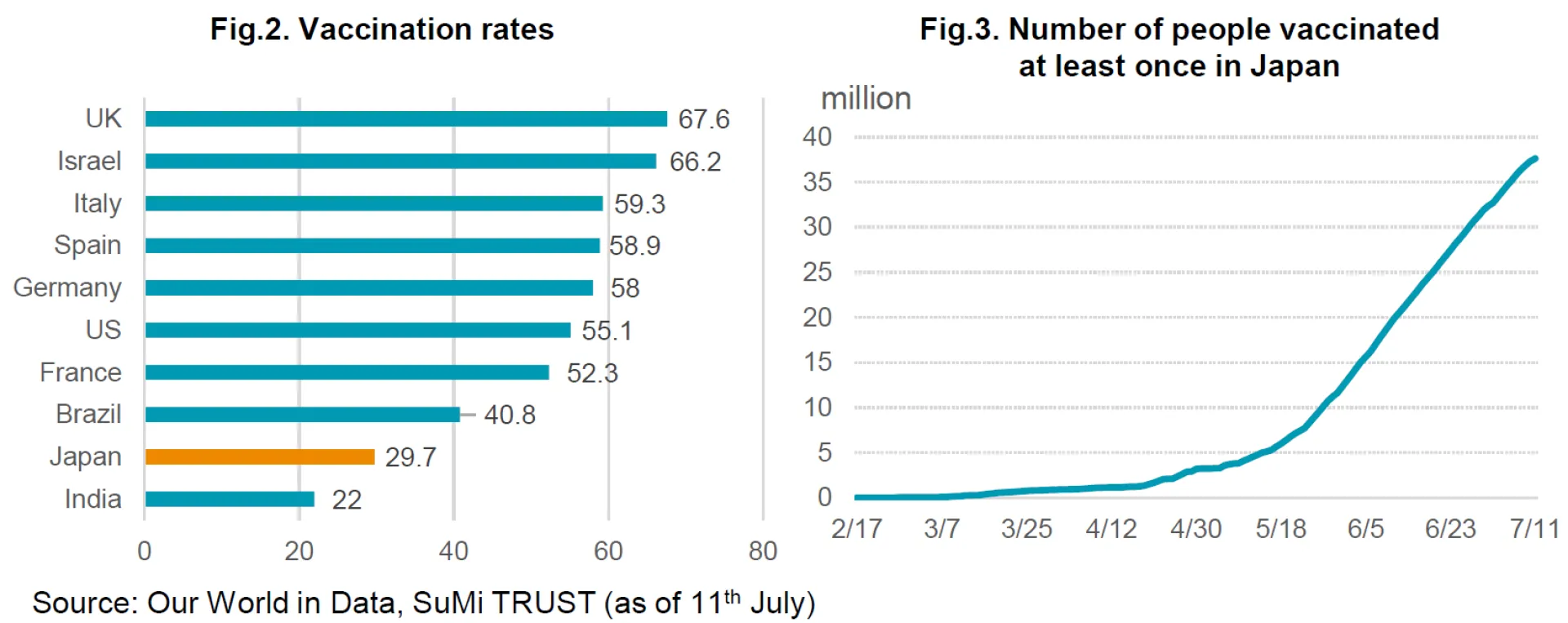
1. The Liberal Democratic Party struggles in the primaries
On July 4th, the much heralded Tokyo Metropolitan Assembly election (127 seats in total), which was considered as a prelude to the national election, was held. Initially, the ruling coalition of the Liberal Democratic Party and the Komeito Party in the Diet was predicted to win a majority (64 seats). But results showed that although the Liberal Democratic Party regained its first party status by winning 33 seats (against 25 seats before the election), and all Komeito candidates (23) were elected, the coalition did not reach majority. The Liberal Democratic Party won more seats this time against the previous election when it suffered a catastrophic defeat, but it was the second smallest number of seats in history. Meanwhile, opposition parties such as the Constitutional Democratic Party and the Communist Party have both increased their seats. The Tokyo Metropolitan Assembly election has become a leading indicator of national elections that are held later in this year. And in the past, there have been notable political repercussions after the Tokyo Metropolitan Assembly election. In this respect, the results of this election have given the LDP a sense of crisis about the coming lower house election. It has become clear that many Tokyo residents are dissatisfied and anxious with the measures against COVID-19 and the increase of the number of cases attributed to the Tokyo Olympic and Paralympic Games.
2. The Tokyo Olympics will be rammed through
On June 21st, the International Olympic Committee (IOC), the International Paralympic Committee (IPC), the Games Organizing Committee, the Tokyo Metropolitan Government, and the Government of Japan agreed to hold the Olympic Games with limited domestic spectators. However, with the number of COVID-19 cases on the rise again, the state of emergency has been reissued in Tokyo. Thus, now it will be held without spectators in general.
According to various opinion polls, many people have shown their opposition to hosting the Tokyo Olympic and Paralympic Games. With progress of vaccinations falling behind other developed countries, the Japanese people are deeply concerned about further spread of COVID-19 caused by the Olympic Games. Given that the Suga administration has decided to hold the Olympics against the will of many people, a successful Olympics while controlling the number of infected people is a must for the survival of the administration.
Strict infection control measures are expected to be implemented during the Olympics. It consists of two broad measures: vaccination in advance for athletes and other participants, and control of human flow through bubbles. Regarding vaccines, Japan has established a system that allows all those willing to inoculate themselves. This includes the Japanese team (including coaches), overseas teams, volunteers during the tournament, and the media. According to the IOC, about 80% of Olympic officials are expected to be vaccinated. On the other hand, according to the "Playbook (Rules)" that summarizes infection control measures for athletes, the range of activities for athletes during the tournament is, in principle, limited to the Olympic Village, competition and practice venues (the so-called “bubble” method). Athletes are not permitted to visit tourist spots, eat at restaurants outside, or use public transportation. In addition, participants from overseas are required to undergo two PCR tests within 96 hours of departure to Japan, and obtain a negative certificate. Athletes are tested daily during their stay. Any violation may deprive the right to participate in events and a fine may be imposed.

3. Vaccinations, which were noticeably delayed, accelerated rapidly
Due to the time-consuming process of vaccine approvals and the lack of people to administer the vaccine, Japan’s vaccination program had fallen behind major countries of the world (Figure 2). However, feeling a sense of crisis about the slow progress of vaccination, the Japanese government implemented various measures and finally pace of vaccination has picked up since June (Figure 3). It approved the Moderna vaccine on May 21st and expanded the range of those who can administer the vaccine (In addition to doctors and nurses, injections can be administered by dentists, paramedics and clinical laboratory technicians). Mass inoculations at large-scale inoculation centers and workplaces has also begun. The bottleneck issues have been resolved.
Inoculations for the general public (by the highly effective Pfizer and Moderna vaccines) have already begun in June, and vaccination of elderly people (65 years old and over) is scheduled to be complete by the end of July. The effects of vaccinations have begun to appear and there has been a significant decrease in severe cases among elderly people. If the recent pace of inoculations can be maintained, Japan is expected to achieve herd immunity by the end of the year. In September-October, when the general election of the House of Representatives is expected, vaccinations are expected to be widespread in the streets, and the Suga administration will conduct an election campaign based on the accumulation of vaccines.
4. Implications
As mentioned above, the results of the House of Representatives general election after the Olympic and Paralympic Games will depend largely on the success of the Games, and the successful administering of vaccinations while keeping the number of infected in check. With vaccinations spreading rapidly toward the general election of the House of Representatives (where 465 seats will be contested), if the Olympics are held without resurgence in number of infected, it is highly likely that Suga will be reelected (our main scenario). Witnessing the success of Japanese athletes at the Olympic and Paralympic Games, public opinion, which is opposed to the event, will lean toward the Suga administration. Currently, there is no strong opposition party that threatens the LDP, so it is certain that the LDP will continue to be the first party. Several Liberal Democratic Party executives have made statements in support of Suga’s succession. It is said that the Liberal Democratic Party will require a single majority of 233 seats (currently 284 seats) at the election, so the hurdles for reelection of the Suga administration are not very high.
In 2021, Japanese stocks have been underperforming the US markets. In addition to the delay in vaccination, the risk of COVID-19 spreading due to the Olympics has also been factored in. If the Olympic Games are held without resurgence in number of infected amid strict control measures, there is more room for Japanese stocks to rise on expectations that policies will be carried out with the backing of Suga's solid political foundation. In response to the unexpected outcome of the Tokyo Metropolitan Assembly election, the Liberal Democratic Party is expected to announce a large supplementary budget ahead of the general election of the House of Representatives, which would also support Japanese stocks. As part of the large supplementary budget, we expect the food-service industry, which was severely impacted by COVID-19, to receive support measures, and for the travel industry to see the relaunch of the Go To campaign, which subsidies for expenses of travel and accommodation. With these measures, we can expect to see a rally among share prices in such sectors.
Considering the accelerated rate of vaccinations, it is highly unlikely that we will see Prime Minister Suga resign due to re-spread of the virus triggered by the Olympics. Should it occur, Japanese equity market will fall on the backdrop of political unrest (our risk scenario). However, should this be the case, the failure of the Olympics should not have a marked impact on corporate performance, and the decline in Japanese share prices is expected to be temporary and limited. Even if Prime Minister Suga resigns, the next prime minister is likely to be from the Liberal Democratic Party, and current policies are likely to be carried over. In addition, considering the rapid progress of vaccinations, we believe that a medical collapse can be avoided, and that it will be possible to accelerate to normalize economic activities while continuing infection control measures. Even under the risk scenario, Japanese equities are expected to pick up as economic activity normalizes.
